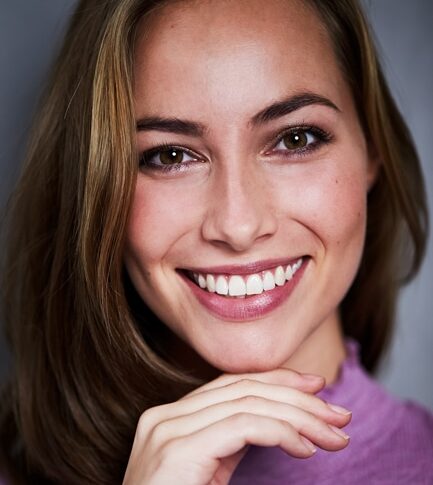ESTHETIC & BEAUTY
Skin care

ESTHETIC & BEAUTY
Skin care
SKIN STRUCTURE
The skin is made of various layers and the outermost one is called the epidermis. It protects us from external threats like microbes and pollutants that could enter our body. Sometimes, this layer can become irritated or dry but it should regenerate itself in a couple of hours.
The epidermis is the outermost layer of your skin and it's extremely thin. It typically consists of 15-25 layers of epidermal cells and gives you a level of protection against microorganisms, such as bacteria. The dermis layer has a rich fabric of collagen, blood vessels and glands. The epidermis is the thin outer layer of the skin that's responsible for repelling harmful particles and providing a moisture balance. It also contains melanocytes which continuously produce melanin, a pigment that blocks harmful forces. Basically, the dermis consists of three substances. They are: collagen, elastin, and protein fibers in addition to certain polysaccharides. These things provide properties such as durability, flexibility, and moisture retention to the skin. Beneath the skin, there is another layer known as the basal layer. It is in this layer that new cells are constantly produced.
Cells gradually move towards the upper layers of the skin, where they lose their vitality after about 14 days. They are then pushed up to top layers, forming a hard layer called Succi (horn-like layer). New skin cells layer over the old ones. Dead skin cells need to be shed for the top cell layer to stay healthy, so the two layers are constantly changing.
SKIN CARE
Our skin is our largest organ and it guards against external factors by enveloping vital organs. Minerals, vitamins, and important elements are also stored in the layers of our skin and these are necessary for keeping our body healthy.
Protecting our skin, which is such an important aspect of health, should be a priority. It doesn't matter if we are a man or woman - having a great looking complexion can be our most special accessory. No matter our age, we want to feel confident that our skin is both healthy and beautiful. What's more, it can show us how fast we age!
The reason our skin ages largely depends on two factors:
1-) External aging due to genetic factors: This kind of aging is programmed with genetic factors you inherit from your mother and father and cannot be changed by any means.
2-) External aging due to environmental factors: The most important factor in this process is sun rays. If we do not take steps to protect our skin from the damaging effects of the sun and stop providing adequate care for our skin, the sun will cause spots, wrinkles and other signs of premature aging.
There are many environmental and lifestyle factors that accelerate our skin's aging process. They include smoking, alcohol, substance abuse, malnutrition, use of wrong cosmetic products and insufficient sleep among others.
Internal factors account for 20% of the aging process, while external influences make up 80%.
Our skin is polluted by the effect of environmental conditions throughout the day. As we go about our day, we're exposed to grime in the form of automobile exhaust fumes, make-up residues, and other contaminants that can accumulate on your skin. This prevents your skin from taking on its normal functions to produce healthy pores and cells.
Cleansing the skin should be done as often as possible. The right cleanser can help remove all the negative factors on your skin, such as environmental pollutants and dirt. This preserves a healthy barrier function, allowing your skin to breathe. It strengthens the skin making it able to maintain its normal functions. Skin's upper parts eventually die and are shed, replaced by new cells from the lower layer. As a result of aging, this cycle slows down. Old cells don't get renewed & discarded as easily. Soon, the skin gets rougher, drier and less pliable. The radiant, healthy glow of skin is lost when we don’t take care of it. It’s important to take care of our skin from time to time, even if it means going without a day or two.